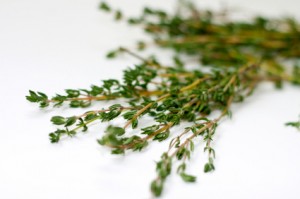
More evidence that low-calorie sweeteners are bad for your health
Studies show that artificial sweeteners can raise the risk of hypertension, metabolic syndrome, type 2 diabetes and heart disease, including stroke.

Don’t let its delicate looking leaves fool you – thyme packs a big punch in terms of flavour but also as a medicinal herb.
Thyme, botanically known as Thymus vulgaris, is a perennial garden herb that has been used in food and medicine for thousands of years. The ancient Egyptians made use of the preservative effects of its essential oils to assist embalming. The ancient Greeks used it in baths and as incense in their temples to clear the air, keep insects away and also to inspire courage. In the Middle Ages, Europeans would placed it in or under pillows to ward off nightmares and promote restful sleep.
Every good cook will know thyme’s value in the kitchen; on its own to bring out the flavour of meat and poultry dishes, or tied together with fresh parsley and bay leaves (and sometimes sage, rosemary, basil and/or tarragon) as a bouquet garni to flavour soups, stocks and stews. Thyme also makes an excellent garnish for roasted vegetables such as carrots, swede, squashes and potatoes.
Kitchen therapy
Blended into soups and stews thyme’s essential oils, which help increase circulation, are a perfect way to warm yourself up from the inside on a cold autumn or winter’s day.
Brewed in a tea thyme energises the whole system, and through its fortifying effect on the nervous system it is excellent for treating physical and mental exhaustion, tension, anxiety and depression.
The relaxant action of thyme can help relieve wind and cramping in the stomach and bowel and can be a useful treatment for those with irritable bowel syndrome. It’s also a good choice for treating diarrhoea, bowel infections and ‘holiday tummy’ and to help re-establish a normal bacterial population in the gut.
Nutrient rich
These traditional uses persist today and, in addition, we now know that thyme is as good of the body as it is for the mind. According to the USDA, 3g (about 2 tsps) of dried thyme (roughly equivalent to 28g or 1oz of the fresh herb) meets about 60% of your daily needs for vitamin K, 20% of your iron, 10% of your manganese and 5% of your calcium.
It is also rich in the volatile oil constituents carvacolo, borneol, geraniol and thymol.
These substances have been proved to have anti-bacterial and anti-fungal properties against Streptococcus mutans, Staphalococcus aureus, Bacillus subtilis and E. coli.
It is also effective against Shigella sonnei, a bacteria that causes diarrhoea. Washing lettuce in a solution that is just 1% thyme oil or thymol has been shown to drop the number of Shigella bacteria below detection point. Scientists are now trying to develop natural food preservatives based on thyme essential oils.
While individual constituents of thyme are effective, there is also evidence that in some instances they are no more effective than thyme oil or extract, suggesting they work synergistically in the whole plant.
A powerful antioxidant
These days modern science is finding some basis for thyme’s traditional use as an energy tonic and aid to longevity. It’s not just thyme’s volatile oils and vitamins and minerals but its antioxidant phenols and flavonoids, that make it so beneficial in protecting DNA against oxidative damage.
The volatile oils in thyme have been found to help protect the brain by increasing beneficial omega-3 fatty acids in the brain, keeping the body’s cells healthy and helping to slow the ageing process.
Fatty acids are vital for building cell walls and for maintaining the structure of the brain, the nervous system and blood vessels. Because it is a powerful antioxidant, thyme helps protect these fats from damage caused free radicals. Studies are ongoing to determine whether thyme might help prevent Alzheimer’s disease.
For colds, coughs and more
Thyme’s antiseptic and antibiotic properties make it a great remedy when you have a cold, cough or sore throat. The German Commission E, which evaluates safety and efficacy of herbal preparations in Germany, has approved it for the treatment of bronchitis and coughs. So the next time you have a sore throat or congested chest try a cup of thyme tea.
Hot thyme tea sweetened with a bit of honey is also good for bringing down fevers, as encourages perspiration. A cool or lukewarm tea is a good choice for cystitis and an irritable bladder, particularly if combined with soothing herbs like marshmallow and couch grass. Because it helps to clear excess uric acid from the system, thyme is also sometimes recommended to relieve arthritis and gout.
In the bath
Of course, thyme can be used externally as well. The essential oil, mixed into warming liniments and lotions, is wonderful for rubbing into aching joints and muscles. Thyme tincture mixed with a little water makes a good antiseptic lotion for cuts and grazes and mouth ulcers. As an anti-fungal, thyme is a great remedy for thrush and athletes foot.
Finally, if you are feeling a bit over-stimulated or down in the dumps, thyme is an adaptable remedy that brings immediate relief and promotes restful sleep. To enjoy a thyme bath tie around 200g of thyme sprigs together and let this steep in the hot water. Alternatively mix a few drops of the essential oil in a eggcupful of milk and pour into the water.

Please subscribe me to your newsletter mailing list. I have read the
privacy statement